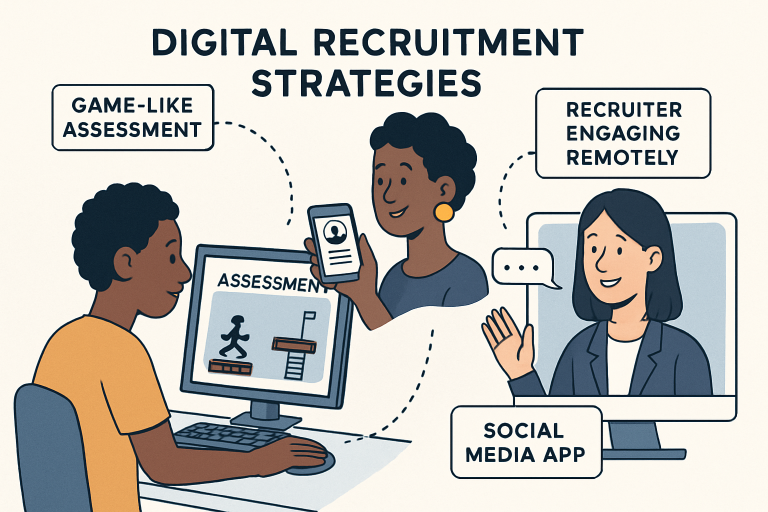Creative Recruiting Strategies for Modern HR
Key Takeaways
- Innovative recruitment methods can significantly enhance talent acquisition.
- Leveraging technology and social media platforms broadens the candidate pool.
- Employee engagement in the hiring process fosters a more dynamic recruitment environment.
Introduction
Traditional recruiting methods are becoming less effective in today’s rapidly changing job landscape. Modern HR professionals must think outside the box to effectively attract, evaluate, and hire top talent. Companies that embrace innovation in recruiting can secure a competitive edge, especially as candidates seek workplaces that align with their values and expectations. Leveraging a recruiting website can help broaden the candidate pool and seamlessly integrate advanced strategies into recruitment processes, making it easier than ever to connect with the right candidates.
Cutting-edge recruiting platforms enable HR teams to showcase company culture, streamline workflow, and incorporate technology-driven tools that appeal to tech-savvy candidates. By adopting these new methods, organizations signal to prospective employees that innovation and adaptability are integral to their workplace, heightening their appeal in a crowded job market.
Gamification in Recruitment
Integrating game elements into hiring can drastically improve candidate engagement and assessment accuracy. Tech giants and startups leverage gamification to reveal critical skills such as creativity, teamwork, and resilience. For example, Google famously used cryptic challenges to assess problem-solving skills, while other organizations develop custom assessments that resemble video games or interactive puzzles.
This approach doesn’t just gauge a candidate’s technical ability, but also provides insight into how they approach challenges, function under pressure, and fit within team-oriented environments. Gamification can be customized to reflect a specific company’s culture or the unique demands of a role, making it a versatile addition to the modern recruitment toolkit.
Leveraging Social Media Platforms
Social media channels have transformed talent acquisition by allowing organizations to meet candidates where they are most active. Platforms such as TikTok, Instagram, and LinkedIn enable recruiters to engage a diverse pool of applicants through creative storytelling, authentic behind-the-scenes footage, and live Q&A sessions. Companies are using short-form video content and interactive posts to highlight their workplace atmosphere and day-to-day operations, appealing especially to younger demographics and digital natives.
This strategy delivers higher reach, fosters brand awareness, and provides candidates with genuine glimpses into company culture, factors pivotal for attracting top performers. According to Forbes, companies that harness social media effectively report a significant increase in applicant quality and quantity.
Employee Referral Programs
Referrals remain among the most reliable sources for quality hires, as employees are best positioned to recommend people who align with company values. Progressive organizations are reimagining traditional referral programs by introducing gamified elements such as points, tiers, and rewards for successful recommendations. These systems incentivize participation and foster a sense of ownership and involvement among staff members.
Referral programs further support a positive workplace culture by amplifying networks of trust and familiarity, often resulting in quicker onboarding and improved retention rates. When employees are part of the recruitment effort, they act as ambassadors for the organization, enhancing its overall employer brand.
Virtual Reality (VR) Job Simulations
Virtual reality is revolutionizing how candidates experience potential roles. With VR job simulations, applicants engage in real-life scenarios and tasks they would encounter, offering a transparent and immersive preview. This helps candidates self-assess their fit for the position and supports recruiters in evaluating competencies and comfort with job functions.
VR also adds a layer of accessibility, as candidates can participate from anywhere in the world. Industries from healthcare to engineering are adopting this technology, leading to more informed decision-making during hiring and reducing post-hire mismatches.
Hosting Hackathons and Competitions
Hackathons and business competitions are trending tactics for attracting specialized talent. These events test hard skills and showcase creativity, problem-solving, and leadership abilities. Companies like Facebook and Microsoft have hosted global hackathons that bring together current employees and external candidates, facilitating direct recruitment based on real-world performance.
Such events serve as live auditions, enabling recruiters to identify high-potential candidates who excel under pressure and can deliver innovative solutions. Participants often leave a positive impression of the company, becoming brand advocates or future applicants, even if they aren’t immediately hired.
Building Talent Communities
Modern recruiting goes beyond filling immediate vacancies—it involves building long-term relationships. Creating branded talent communities or online networks gives organizations a platform to engage with passive candidates, nurture future talent, and keep their pipeline active. These online spaces may offer networking events, industry insights, or informal chats with team members to foster ongoing dialogue.
Candidates value transparency and authentic connections, making talent communities an effective tool for demonstrating company culture and expertise. Businesses prioritizing building relationships over transactional recruitment are better equipped for long-term success, even in highly competitive sectors. The HR Executive emphasizes that such proactive approaches are pivotal in responding to rapid workforce changes.
Conclusion
Embracing creative recruiting strategies is no longer optional for organizations aiming to hire the best. By integrating technology, gamification, social media, and employee advocacy, forward-thinking HR teams can attract, evaluate, and retain the top-tier talent critical to maintaining a competitive edge. As the job market continues to evolve, employers prioritizing innovation and authentic engagement will remain agile and appealing to the workforce of tomorrow.
